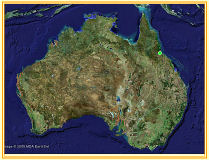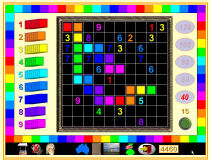As Magicama – Beyond Words opens, you see a
satellite photograph of the continent of Australia, with a bull’s-eye icon
on the eastern coast. Placing the cursor over this icon brings up a
picture of a gold cloth and a small wooden box. Click on the icon and you
are transported to a pastoral scene, looking at a sign that says “Mulawa”
– the only word of identification in the game. So what’s in the box that
designer Peter Hewitt of Mulawa has left behind?
Well, first you must find the box. Searching the landscape for this
hidden “treasure” leads off the many challenges in Magicama – a
collection of thirty games in all. Although some of Magicama’s
games could be termed puzzle games, others are board games or card games.
A few are variations of familiar games; most are truly novel. Many involve
color and motion. None come with instructions. Just figuring out what some
of these games are about is a challenge in itself.
Brain-Teasers for the Rest of Us?
First, a disclosure – I am not a puzzle achiever and I rarely play
board or card games. I usually play adventure games, and these I play as
much for the exploration and the story as for the puzzles. I’ve played
“pure” puzzle games in the past (Pandora’s Box, for instance), but I’ve
rarely had the patience to see one through to the end. The fact that I
finished Magicama (with the occasional help of in-game Hints) means
that anyone can prevail and enjoy this engaging and successful game.
Magicama takes you up and down the Australian coast through
detailed photographs of verdant landscapes. Sometimes these photographic
locations involve moving in a linear path; sometimes they are environments
with 360 degree panning. The locations are identified on the map of
Australia, but other than that you know nothing about them. They provide a
setting for a seek-and-find game, but they do not tell a story. As you
search the landscape, you’ll hear classical piano music playing in the
background. Unusual, but it works.
Spicy Variety – Plus Brain Training
The games in Magicama present varied and very clever challenges.
For instance, several employ different kinds of shapes, which you connect,
spin, fit, stack, paint or count. Pictures appear which must be
remembered, associated, or put back together. You’ll decode patterns and
experiment with moving objects and their angles, outlines and colors.
You’ll follow paths, block anticipated movement, strategize, configure,
and weigh things.
The games are presented in a fashion that is extremely easy on the
eyes. Each has its own colorful presentation. Some of the game boards have
photographs or abstract designs as backgrounds. Many of the game pieces,
buttons and frames have attractive textures. Discriminating colors is
essential. No need for sound discrimination or tone matching though – and
no mazes, sliders or math calculations.
When you have completed each game, a gold frame appears around that
game’s image in your game journal. After completion, you have the option
of taking on a timed challenge. (It is not necessary to do this in order
to finish the game, but you will get an added graphic finale if you
complete all the timed challenges.) Timed challenges can be attempted
multiple times – failing to finish before the time has expired has no
affect on your current score.
After completing the first (and easiest) level of each game, you can
return to the map where a new location becomes accessible. One possible
gameplay strategy -- playing just one level of the first game, then going
on to the beginning level of the second game, progressing this way right
through to the thirtieth game. Gleefully sampling a bit of everything, you
will realize the full scope of what awaits you -- and will begin to see
the way the designer’s mind works. However, you may be derailed from this
initial survey approach, as certain games are bound to lure you into
spending hours before you can tear yourself away.
Players will find that they are naturally good at some of these
challenges -- and rather bad at others. I loved the games that tapped
right into the way I think and analyze problems. But part of the
Magicama experience is accepting unfamiliar challenges. The games that
initially confounded me were very good brain trainers, teaching me new
ways of seeing and thinking, and giving me many “aha!” moments. By the
time I had beaten them, I was better at noticing details and patterns. I
could more readily see the “whole” instead of just the parts. And I began
to think more flexibly after reconsidering assumptions and trying out new
strategies.
Three Winners
I can’t take the time to describe all thirty of Magicama’s
games. So I’ll say a few words about three of my favorites.
Number Eight: A black drawing surface with six stars of
different colors. Above the stars – swathes of webbed color in different
formations. Your mission – copy these swathes by experimenting with the
stars and deciding how they should be associated with one another. The
game requires experimentation and close observation as you employ your
palette to create elaborate, detailed and colorful artwork.
Number Four: A unique jigsaw puzzle. The pieces are
variously sized rectangles, with pieces and images overlapping. When the
pieces are misplaced, their images can become pixelated or obscured.
Putting them in their right spots brings the picture into proper focus.
Number Fourteen: A bit like poker. A bit like solitaire.
The luck of the shuffle, combined with strategy and (if you’re good) card
counting and memory. A twist at the end that’s discoverable through
experimentation. This one was extremely addicting. “Just one more hand,” I
keep telling myself, “I know I can beat my best score.”
The Interface
Magicama features a point-and-click interface. Location searches
are conducted via a first person perspective. All the games use the mouse
to select and place the various game pieces. Your progress is saved
automatically.
Various tools are found at the bottom of the screen (you bring these up
by moving the cursor to the bottom). You can turn the sound on or off or
get a hint. Sometimes a mouse icon appears, signifying that you can use
the right mouse button for different moves. Other tool icons include a map
of Australia with links to each location, a game journal that lets you
directly access the games you’ve started playing, and a bag that indicates
how many points a particular challenge is worth (this changes to a clock
when you’ve finished the timed version of that game). Here you’ll also
find the game exit icon and a sign designating the running score – points
can only be lost if you choose to use the Hints feature.
Hint, Hint – How I Made it Through
The Hint system, accessed through the photo of Peter Hewitt among the
tool icons, is a welcome and thoughtful element of this game. I was
grateful to get help when I needed it. After finishing Magicama, I
went back and (out of curiosity) tried out all the Hints. Just as the
games are varied, so are the hints. Sometimes the game places one piece on
the board or selects one card for you. Occasionally, it plays an entire
sequence. One time, the hint merely slowed a moving puzzle down to make it
easier to see. Accessing the Hints feature lowers your final score
slightly. But since the top score for this game approaches 20,000 points,
the loss of a few hundred points in exchange for hints is an acceptable
bargain.
Magicama is fun to play as a family or with a friend. You can
each choose an icon at the beginning and play your own game separately. Or
you may sit side-by-side and collaborate. A Magicama forum permits
noodling with other friendly puzzle lovers. Once completed, several of the
games can be replayed indefinitely -- especially those with randomly
generated cards or board game-like configurations. This game can be as
challenging or as relaxing as you choose and can last as long as you like.
The Downsides
I experienced one glitch in Magicama that halted progress by
preventing me from going my merry way to the next location on the map. I
contacted tech support, and sent a saved game to Peter Hewitt, who quickly
modified it. After that, the game was glitch-free.
A couple of minor issues – in Game Twenty-seven, you arrange shapes to
match a template. However, the solution check was inconsistent – at first
the shapes had to be arranged with absolute precision, then later I “won”
despite obvious gaps in the arrangement. (Did the game sense that this was
a puzzle I was struggling with and decide to go easy on me?) In the Turtle
game, I would have liked access at all times to a variety of colors so
that I could create my own tessellated artwork.
The last downside: the timed version of the Sudoku-like game allows
only fifteen minutes for completion. Despite repeated attempts, I never
came anywhere close to this time. Clicking the Hints icon gave me only a
smiley face, but no help. I finally cheated by copying the game board from
the screen onto paper, going through and solving it -- which took nearly
an hour. Then I filled in the correct pieces on the in-game board, which
alone took a full four minutes. While beating the game in fifteen minutes
may be possible for a Sudoku expert or a very fast thinker, it is almost
impossible for a Sudoku amateur like me.
It’s Only Words
It is quite an accomplishment to have created a game as complex as
Magicama without using a single word of explanation or instruction.
The gamer works in the realm of thought -- mind-to-mind with the designer.
Nevertheless, by the end of the game I wanted more. Not so much an
explanation of how to play -- that was fun to figure out on my own. What I
wanted was some context, maybe a bit of a story or an explanation for the
quest down Australia’s coast.
I started reading Peter Hewitt’s Magicama journal, which was
posted on GameBoomers and is also available
here. The entries provided some insight into how and why the various
games were created, and how the journey quest related to them. I recommend
this as an absorbing read for anyone who has played the game and is
interested in the story of its creation.
Who Should Play Magicama?
If you like casual games, and find it relaxing to putter around in a
puzzle or board game from time to time, Magicama will bring you
visual treats and some unique challenges. If you want to train your brain
in a new way, this is certainly a game that will accomplish that goal (and
you have the Hints feature to fall back on when necessary). If you are a
puzzle aficionado, the decision is a no-brainer (so to speak) -- you
must play this game.
Final Grade: A-
Magicama is an Independent Production of Mulawa Dreaming and can
be purchased
here.
My Computer Specs:
Windows XP Professional
Pentium 2.80 GHz
2046 MB RAM
Direct X 9.0c
512 MB NVIDIA GeForce 7800 GTX
SB X-Fi Audio
April 2007
design copyright ©
2007
GameBoomers
Group



